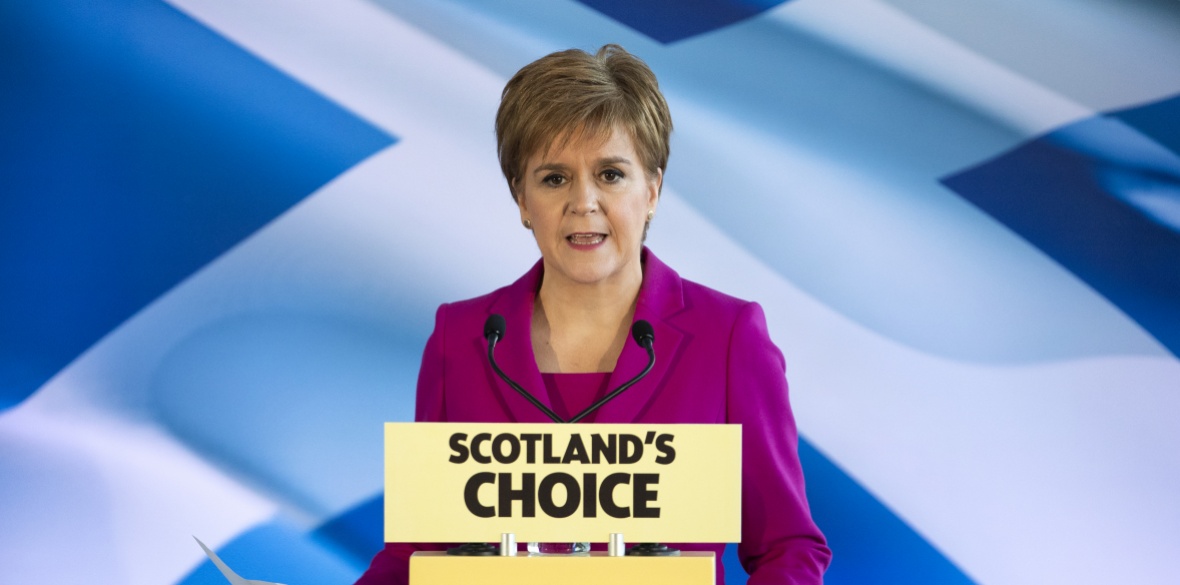This is the last article you can read this month
You can read more article this month
You can read more articles this month
Sorry your limit is up for this month
Reset on:
Please help support the Morning Star by subscribing here
SCOTLAND, fundamentally, is a nation. But we have to delve into its history to start to understand how the national question has developed.
Our nation formed in the 9th century, it existed as a nation until 1707, when the Act of Union, building on the previous century’s Union of Crowns, saw Scotland unify with its historical rival, England, to form Great Britain.
Like most western European nations, Scotland developed firstly into a feudal and then into a capitalist nation.
During its near millennium of independence it often clashed with and was influenced by its English neighbour.
This relationship, this influence, saw a gradual fusion; we begin to see a common language, distinctive territory, shared economic life, religion and monarch.
Episodes such as the wars of independence leading up to the early 14th century, the dual crowns under the Scottish house of Stuart, the covenanters, the glorious revolution, the industrial revolution and rapid expansion of the British empire show that Scotland, unlike our Irish comrades, shared a different, far more equal relationship with England.
Undoubtedly, we fought our wars with England as Ireland did, but we were not simply gobbled up as the Irish nation was, we were not subjected anywhere near the 800 years of national oppression, starvation and slavery which Ireland continues to recover from. Our nation punched above its weight as a partner in Great Britain’s imperialist actions.
While it’s true that there was huge upheaval and revolt upon the passing of the Act of Union, and while cultural icons such as Burns have helped preserve and extend the Scottish identity as one distinct from Britain, there is no arguing that Scotland, particularly her ruling class, which has fused expertly into the British state, profited on the back of her participation in British imperialism; in the exploitation of peoples, resources and land of the colonies. We need only look at our public buildings, statues and street names to confirm this.
Modern-day nationalism in Scotland is often claimed to be in contrast to normal ideas of nationalism, in that it isn’t oppressive; it is civic nationalism, that is not racist, that includes all who wish to share in building a better nation for all to share in.
This was the basis for the independence campaign, which was and is incredibly compelling in the face of Tory austerity.
Why should Scotland continue in a union which brings no benefits, especially when, to many Scots, we have our own national culture, identity and political mindset?
The problem with this assertion is that when you look under the surface you see that the case put forward by the SNP in 2014 was heavily dependent upon pleasing the powers that be by retaining the monarchy, Nato and EU membership, Trident, the pound — in reality, exchanging the union flag for the saltire, while continuing to promote little more than capitalism with Scottish characteristics.
In 2019, the Growth Commission is not in any way a significant break from the white paper, and that is the major sticking point; if we merely fiddle around rather than directly confront the power of the ruling class, they will adapt, they will learn, they will react — merely look at what they’ve done to the most radical Labour platform in a generation, idiocy on Brexit aside.
James Connolly remains correct: “If you remove the English army tomorrow and hoist the green flag over Dublin Castle, unless you set about the organisation of the socialist republic your efforts will be in vain. England will still rule you. She would rule you through her capitalists, through her landlords, through her financiers, through the whole array of commercial and individualist institutions she has planted in this country and watered with the tears of our mothers and the blood of our martyrs.”
Of course, there was a left case to be made for independence. This was based upon hope, possibility and huge change.
It captured the hearts and minds of Scottish communities, particularly deprived working-class schemes and there remain many positives to this case.
However, the position of the Communist Party remains the same, respect for the right of nations to self-determination, while also advocating the need to better build working-class power across Britain, very much in keeping with Connolly, whose focus was on promoting social issues; bread and butter issues, which push workers to confront capital itself, rather than national issues which pose no threat to the capitalist system which is the cause of all of the problems which lead people to the wrong conclusions; namely, that the national question takes priority over the social question.
Ultimately, there are no shortcuts to socialism, and that’s what independence in its current guise amounts to, a distraction from the class struggle.
We effect material change through us, as communists, building worker power in the workplaces and communities, building class consciousness, destroying faith in the rigged electoral system, building the extra-parliamentary struggle.
Like it or not, Holyrood is in great danger of just becoming another Westminster, keeping all sorts of reactionary things like the monarchy, Nato and the EU. Independence, then, means independence for the Scottish ruling class to oppress us from Holyrood directly, rather than in Westminster. It means the continuation of a broken capitalist system, with a little less red in the national flag.
For workers, this goes nowhere near close to struggling for a new type of society, one which meets their needs, not their bosses’.
Aiden O’Rourke is Marxist education organiser for the Glasgow YCL.











